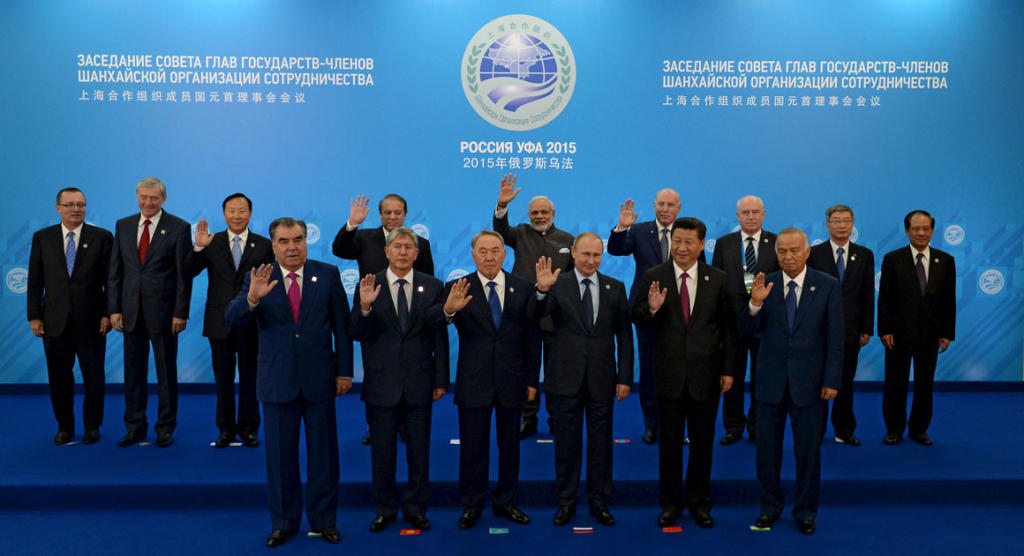
The 2015 Shanghai Cooperation Organization annual summit was held in the city of Ufa, Russia.
The Shanghai Cooperation Organization (SCO) summit meeting in the Russian city of Ufa came a day after the BRICS, (representing Brazil, India, South Africa, China, and Russia), held a summit there. The invitation was extended to India and Pakistan to join the SCO showing the alliance’s desire for a “multi-polar” world to emerge.
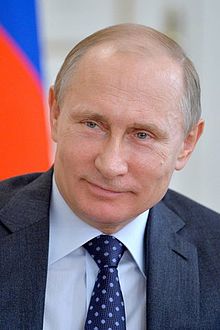
Russian dictator Vladimir Putin
Russian dictator Vladimir Putin has stated that the United States has an outdated vision of a “uni-polar” world dominated by Washington and wants to show that Russia has not been weakened by Western sanctions over its role in the Ukraine crisis. The declaration of the SCO stated the following: “The evolution of the SCO is taking place at a complicated stage in the development of international relations and amidst the emergence of a multi-polar world. These processes are accompanied by increasing security challenges and threats, increasing uncertainty and instability in various regions of the world.”
Putin saw the signs of unity in the SCO and the BRICS – Brazil, India, South Africa, China and Russia – which agreed to coordinate efforts to keep their economies stable, launched a development bank, and agreed on a currency pool.
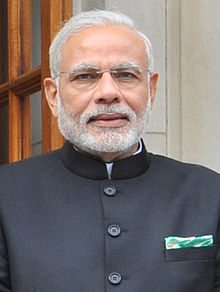
Indian Prime Minister Narendra Modi
Indian Prime Minister Narendra Modi said the expansion of the SCO should serve as a “springboard” for the alliance to become one of the most dynamic in the world. Prime Minister Modi stated the following: “The time has come to reach out across the region. We have everything we need to succeed.”
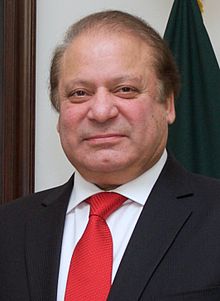
Pakistani Prime Minister Nawaz Sharif
Pakistani Prime Minister Nawaz Sharif said that: “President Putin’s efforts will enhance the political and economic scope of the Eurasian belt.” It is believed that the addition of Pakistan and India, two nuclear-armed neighboring countries which have years of tension between them, could also lead to easing the conflicts between New Delhi and Islamabad.
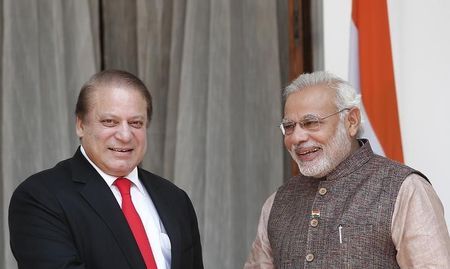
Pakistani Prime Minister Nawaz Sharif meets with Indian Prime Minister Narendra Modi.

Logo of the Shanghai Cooperation Organization (SCO)
Eleanor Albert wrote an article titled “The Shanghai Cooperation Organization” which was published by the Council on Foreign Relations on October 14, 2015. She explained that the Shanghai Cooperation Organization (SCO) is an intergovernmental organization composed of China, Russia, Kazakhstan, Kyrgyzstan, Tajikistan, and Uzbekistan founded in Shanghai in 2001. The SCO’s goals and agenda have broadened to include increased military and counterterrorism cooperation and intelligence sharing. The SCO has also been involved in regional economic initiatives, such as the recently announced integration of the China-led Silk Road Economic Belt and the Russia-led Eurasian Economic Union.
Albert explained that while some experts say the organization has emerged as an anti-U.S. bulwark in Central Asia, others believe frictions among its members preclude a strong, unified SCO. This writer believes that the countries in this alliance are united under the Russian and Chinese leadership as anti-NATO, anti-American, and anti-West with a strong military, energy, trade, and economic alliance.
What is the SCO?
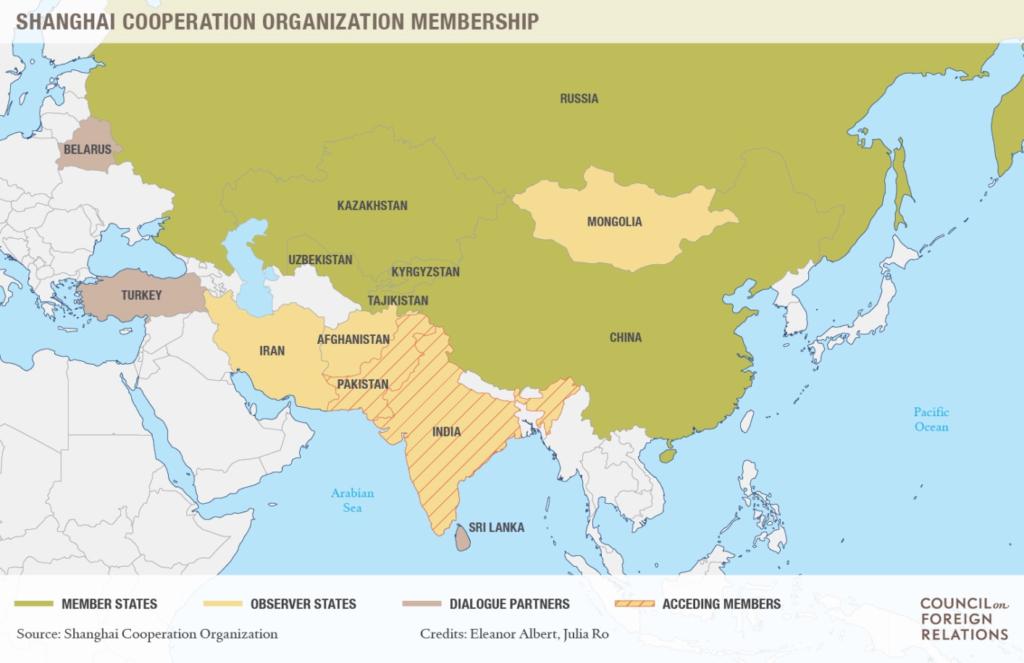
The headquarters of the SCO is in Beijing, China and the official languages are Chinese and Russian. As the above map indicates, the Shanghai Cooperation Organization (SCO) is an alliance composed of China, Russia, Kazakhstan, Kyrgyzstan, Tajikistan, and Uzbekistan. The SCO will have two new acceding members, which are India and Pakistan. It also has four observer nations and six dialogue partners which are Sri Lanka, Turkey, Armenia, Azerbaijan, Cambodia, and Nepal.
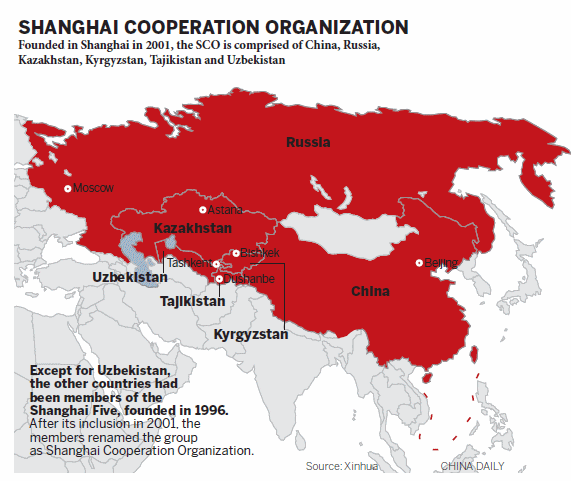
The Shanghai Cooperation Organization (SCO) is an alliance composed of China, Russia, Kazakhstan, Kyrgyzstan, Tajikistan, and Uzbekistan.
Eleanor Albert stated the following: “Originally organized as the Shanghai Five in 1996, the organization added Uzbekistan in 2001 and renamed itself the Shanghai Cooperation Organization. The six member states occupy territory that accounts for three-fifths of the Eurasian continent and have a population of 1.5 billion, a quarter of the world’s population. In addition to the six member states, the SCO has two new acceding members, Indian and Pakistan, four observer nations, and six dialogue partners. As laid out in its charter, the organization functions as a forum to strengthen confidence and neighborly relations among member countries and promote cooperation in politics, trade, economy, and culture to education, energy, and transportation. The SCO has two permanent headquarters, the secretariat in Beijing and the Regional Anti-Terrorist Structure (RATS) in Tashkent, the Uzbek capital. One of the organization’s primary objectives is promoting cooperation on security-related issues, namely to combat the three evils of terrorism, separatism, and extremism. The organization adopts decisions made by consensus, and all member states must uphold the core principle of non-aggression and non-interference in internal affairs.”
Albert pointed out that in 2014, China held the SCO’s Peace Mission and its largest military exercise in terms of the number of troops involved, more than 7,000, and advanced weaponry deployed. Other SCO’s priorities are initiatives to deepen economic and energy cooperation, including establishing a bloc-wide development bank.
What role does the SCO play in Afghanistan?
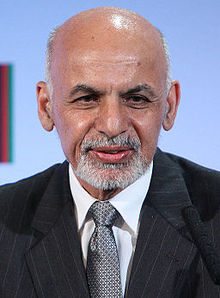
President Ashraf Ghani of Afghanistan was elected on September 21, 2014.
Albert wrote that the SCO does not have much influence in Afghanistan, though the alliance considers religious extremism, terrorism, and drug trafficking in the country as potential serious threats to the region. Its neighboring countries share the fear that instability in Afghanistan will spread beyond its borders.
Albert stated the following: “For Kabul to participate in SCO counterterrorism initiatives, Afghanistan was elevated from an SCO contact group to full observer status at the 2012 SCO summit in Beijing. With the presence of the Taliban and local militants aligned with the self-proclaimed Islamic State and al-Qaeda in Afghanistan, and the drawdown of NATO forces, the landlocked country’s security situation remains a top priority at SCO meetings. New Afghan leaders President Ashraf Ghani and Chief Executive Abdullah Abdullah have backed greater SCO participation in rebuilding efforts, but the organization has had little involvement to date. However, some SCO member nations have intensified bilateral engagement with the country. China, in particular, has sought to play a larger role in stabilizing Afghanistan to protect its substantial investments. Currently, China is the largest SCO investor in Afghanistan, with projects including the $3 billion contract to develop the Aynak copper mine. Leaders in Beijing hope that a stable Afghanistan will have a spillover effect on China’s own restive autonomous region of Xinjiang. Russia, too, participates in a variety of bilateral efforts with Afghanistan, including the provision of weapons to its army, counternarcotic initiatives, and its own investment projects…Central Asian partners, including Kazakhstan and Uzbekistan have also made significant investments in Afghanistan.”
Raffaello Pantucci of the London-based Royal United Services Institute (RUSI) said that in spite of the fact that from 1979 to 1989 the Soviet Union and Afghanistan were at war, today Russia has a vested interest in the country’s security. Moscow views the SCO’s Central Asian members as a buffer zone between Russia and Afghanistan and therefore chooses to strengthen broader regional security to prevent instability in Afghanistan from spreading to Russian borders.

This writer disagrees with this interpretation of Russia’s intentions in Afghanistan. Russia is behind al-Qaida’s efforts to destabilize Afghanistan and force the United States to continue to spend billions in that nation. As the former Soviet-bloc Romanian intelligence officer Lieutenant General Ion Mihai Pacepa has written, the recent wave of Islamic radicalism in the Middle East, from the Arab Spring to the jihadist Benghazi on September 11, 2012 and Cairo attacks, were not the work of spontaneous attacks, but rather the result of decades-long carefully planned operation by the Soviet Union and now by Russia.
The head of al-Qaida, Ayman Mohammed al-Zawahiri, is a KGB agent who works with Russia. Russia is working with all terror organizations to distract the United States. America spent trillions in wars while Putin has been rearming Russia as well as China. Obama’s erroneous and weak foreign policy and his unilateral disarmament have given the opportunity to Putin to become the strong man in the Middle East as well as continue the military aggression of Ukraine.
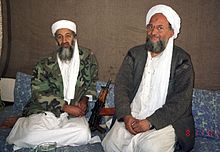
The current head of al-Qaida, Ayman Mohammed al-Zawahiri, appears in the picture with Osama bin Laden when he was second in command.
Does the SCO foster economic cooperation among member states?
Eleanor Albert pointed out that economic cooperation has become one of the organization’s more pressing goals in recent years. At the city of Ufa, Russia, 2015 summit member nations adopted the SCO Development Strategy, which included improving finance, investment, and trade cooperation as a priority over the next ten years. China has pushed the SCO to focus on economic cooperation with proposals like launching a development fund and a free-trade zone. Central Asian member nations, which are in need of infrastructure and energy investment, have been responsive to these overtures despite Russian sensitivities to China’s expanding influence in former Soviet satellites countries.
Eleanor Albert stated the following: “Several SCO member states—notably Kazakhstan, Russia, and Turkmenistan—possess some of the world’s largest reserves of oil and natural gas, driving interest in expanded energy cooperation among members. At a June 2006 summit, Russian President Vladimir Putin called for an energy dialogue, integration of our national energy concepts, and the creation of an Energy Club. During that meeting, member states discussed establishing a unified energy market for oil and gas exports, while also promoting regional development through preferential energy agreements. However, the plans never materialized due to diverging interests between energy consumers and energy producers. China is looking to tap energy resources for its growing demand and while Kazakhstan and Russia are dominant energy exporters, Uzbekistan increasingly needs its energy resources for domestic development and consumption, and the economies in Kyrgyzstan and Tajikistan remain weak. Members prefer to keep national control over their production, supply, and consumption mechanisms and agreements, according to Julie Boland, a former Federal Executive Fellow at the Brookings Institution.”
However, Albert pointed out that regional energy cooperation occurs outside of the SCO. Russia has obtained agreements with several of its Central Asian neighboring nations to build gas pipelines. Beijing’s energy diplomacy has done the same. For example, the Central Asia-China Gas Pipeline involves multiple pipelines, both completed and still under construction, running more than 1,100 miles through Uzbekistan and Kazakhstan to China’s Xinjiang Uighur Autonomous Region.
Albert said that China also agreed to a $16.3 billion fund to integrate the region, reviving old trade routes as part of China’s Silk Road Economic Belt. Energy cooperation is but one facet of the economic exchanges among SCO members. China pitched the establishment of an inter-SCO Development Bank in 2010 as a smaller, regional version of the World Bank and the International Monetary Fund. Though the final document from the 2015 Ufa summit did not address the status of the bank, there are indications that Russia may be more willing to cooperate with China moving forward.
How have Sino-Russian relations shaped the SCO?
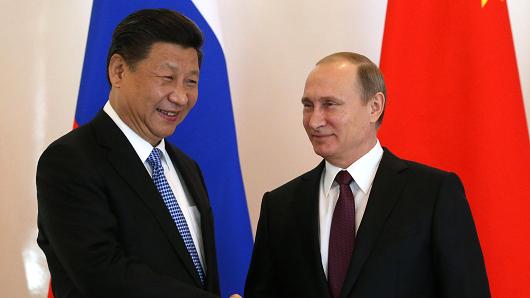
Xi Jingping (born in 1953) meets with Vladimir Putin (born in 1952).
Eleanor Albert stated the following: “China and Russia are the twin engines of the SCO, despite offering differing visions for the organization. Decades of rapid economic growth have propelled China onto the world’s stage, whereas Russia has found itself beset with economic turmoil and geopolitical isolation following its 2014 annexation of Crimea, subsequent ejection from the G-8, and continuing involvement in the Ukraine conflict. In the past year, the Russian economy has faltered amid currency and oil price volatility, as well as an onslaught of sanctions imposed by the West. Moscow is now looking to benefit from Chinese investments, including from energy and manufacturing deals. Since the fallout between Russia and the West, Russia has made its own “pivot” to the East to improve ties with its Asian neighbors, opening the door for greater cooperation between Beijing and Moscow in shaping the SCO agenda. Of late, China’s slowing growth has injected a degree of uncertainty about the future momentum of its economy, but analysts say that due to Russia’s own economy volatility, China will remain crucial partner for an increasingly isolated Russia…Some experts believe that recent moves by Beijing and Moscow, including the agreement to harmonized China’s Silk Road Economic Belt and Russia’s Eurasian Economic Union and bilateral military exercises in the Mediterranean Sea, signal an entente between the two regional powers.”
How will membership expansion affect the SCO?
Albert said that so far the SCO has yet to finalize the expansion of its membership, despite applications from India, Iran, and Pakistan. If the SCO were to accept Iran as a full-fledged member in the future, an attack upon Iran by the United States or Israel would bring war with China, Russia, and the rest of the SCO member nations.
In September 2014, the SCO approved the expansion at the summit meeting and India and Pakistan began the accession process at the July 2015 summit in Ufa, Russia. Belarus, a former dialogue partner, was also upgraded to observer state, and Armenia, Azerbaijan, Cambodia, and Nepal were introduced as new dialogue partners. China claims that SCO expansion would “infuse fresh vigor into the group’s future development and boost its influence and appeal in the international arena.” Russia sees the addition of India and Pakistan as a chance to increase both the SCO’s political and economic potential as well as boost its ability to counter pressing regional challenges.
Adding India and Pakistan to the SCO as members would help the alliance to create a SCO Development Bank. New Delhi would be a source of valuable financing for infrastructure and energy development plans. Additionally, as the world’s largest democracy, India could also give greater legitimacy to the alliance which is basically “a club of authoritarian regimes”.
Geopolitical implications of the SCO
There have been many discussions and commentaries about the geopolitical nature of the Shanghai Cooperation Organization. Matthew Brummer, in the Journal of International Affairs, tracked the implications of SCO expansion into the Persian Gulf.
The fact that India and Pakistan began accession to a regional security group led by China and Russia after two days of summits which President Vladimir Putin held up as evidence Moscow is not isolated in the world. These two nuclear powers nations, India and Pakistan, have just announced dictator Putin as main driver of the unification of BRICS+ and SCO. These four huge nuclear powers have a much larger population, industry, and now alternate trading platform excluding the dollar. This summit was coordinated by Putin, who has repeatedly threatened nuclear war with the Unites States and its NATO allies.
An Iranian writer, Hamid Golpira, wrote the following: “According to Zbigniew Brzezinski’s theory, control of Eurasian landmass is the key to global domination and control of central Asia… Russia and China have been paying attention to Brzezinski’s theory, since they formed the Shanghai Cooperation Organization in 2001, ostensibly to curb extremism in the region and enhance border security, but most probably with the real objective of counterbalancing the activities of the United States and NATO in Central Asia”. There is no question in this writer’s mind that the SCO is an anti-Western military and economic alliance.
Both Russia and China have announced that they want to abandon the dollar as an international currency. This is a major national security threat against our nation, which has hardly been discussed by President Obama or the national media. In fact, the mainstream media and President Obama have seldom discussed the threat of the SCO to America and its NATO allies.
At a 2005 summit in Kazakhstan, the SCO issued a Declaration of Heads of Member States of the Shanghai Cooperation Organization which addressed their “concerns” and contained an elaboration of the organization’s principles. It included the following: “The heads of the member states point out that, against the backdrop of a contradictory process of globalization, multilateral cooperation, which is based on the principles of equal right and mutual respect, non-intervention in internal affairs of sovereign states, non-confrontational way of thinking and consecutive movement towards democratization of international relations, contributes to overall peace and security, and call upon the international community, irrespective of its differences in ideology and social structure, to form a new concept of security based on mutual trust, mutual benefit, equality and interaction.”
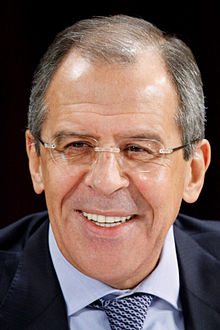
Sergey Lavrov has been the Russian Foreign Minister since 2004.
In November 2005, Russian Foreign Minister Sergey Lavrov reiterated that the “Shanghai Cooperation Organization (SCO) is working to establish a rational and just world order” and that “the Shanghai Cooperation Organization provides us with a unique opportunity to take part in the process of forming a fundamentally new model of geopolitical integration”.
A Chinese daily expressed the matter in these terms: “The Declaration points out that the SCO member countries have the ability and responsibility to safeguard the security of the Central Asian region, and calls on Western countries to leave Central Asia. That is the most noticeable signal given by the Summit to the world”. Chinese Prime Minister Wen Jiabao has concluded that the United States is maneuvering “to preserve its status as the world’s sole superpower and will not allow any country the chance to pose a challenge to it”.
An article in The Washington Post in early 2008 reported that President Vladimir Putin stated that Russia could aim nuclear missiles at Ukraine, if Russia’s neighbor and former fraternal republic in the Soviet Union joins the NATO alliance and hosts elements of a U.S. missile defense system. “It is horrible to say and even horrible to think that, in response to the deployment of such facilities in Ukrainian territory, which cannot theoretically be ruled out, Russia could target its missile systems at Ukraine,” Putin said at a joint news conference with Ukrainian President Viktor Yushchenko, who was later overthrown.
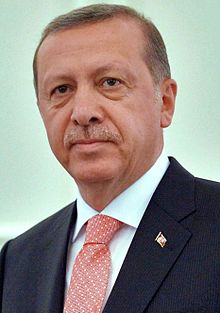
Turkish President Recep Erdogan
How is it possible that Turkey, a member of NATO, could belong to such an anti-NATO alliance? The Islamist Turkish President Recep Erdogan has stated that he has discussed the possibility of abandoning Turkey´s European Union membership candidacy in return for full membership in the SCO.
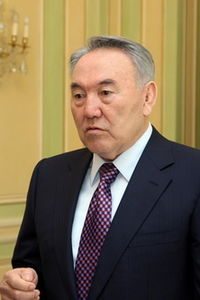
Nursultan Nazarbayev is the president of Kazakhstan.
This anti-Western alliance holds annual summits in the capital of a member nation. In July 2005, at a summit meeting in Astana, the president of Kazakhstan, the host nation, greeted the leaders of the countries in attendance by saying, “the leaders of states sitting at this negotiation table are representative of half of humanity.”
Over the past few years, there have been numerous SCO joint military exercises. China and Russia held large-scale war games in 2005. Since then, Russia and China have continued to conduct joint military exercises, including the use of air forces and precision-guided weapons. The United States applied for Observer Nation status in the SCO in 2006, but it was rejected.
During the 2007 war games in Russia, with the leaders of SCO member nations in attendance, including Chinese President Hu Jintao, Russia’s President Vladimir Putin stated that Russian strategic bombers were going to resume regular long-range patrols for the first time since the Cold War. Putin said the following: “Our pilots have been grounded for too long. They are happy to start a new life.” At that same meeting, an Iranian official said the following: “The SCO is a good venue for designating a new banking system which is independent from the international banking systems.”
Conclusion
The Shanghai Cooperation Organization (SCO) is an anti-U.S. bulwark in Central Asia. This writer believes that the countries in this alliance, with the exception of India, are united under the Russian and Chinese leadership as anti-NATO, anti-American, and anti-West with a strong military, energy, trade, and economic alliance. It is sad that India, the only democracy in this organization, has decided to join the SCO.
